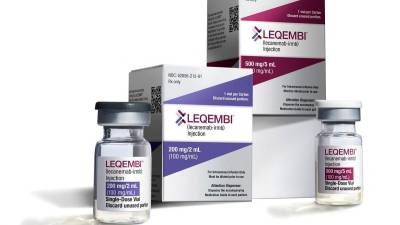THE U.S. Food and Drug Administration has approved an injectable version of Eisai and Biogen’s Alzheimer’s disease drug Leqembi, the companies said on Friday, allowing for an easier treatment option following an initial intravenous infusion.
The approval makes Leqembi the first Alzheimer’s treatment that can be administered at home as a weekly under-the-skin injection, reducing the hassle for patients who now need to travel to an infusion center twice a month for the process that takes about an hour.
The potential for at-home administration could also increase the treatment’s availability for other patients, Lynn Kramer, chief clinical officer at Eisai, told Reuters ahead of the decision.
“It actually may open up more infusion chairs for even greater initiation of the therapy for patients,“ Kramer said.
The injectable version, branded as Leqembi IQLIK, was approved as a maintenance dose for patients who have completed 18 months of bi-weekly intravenous (IV) infusions, the companies said.
Patients would also have the option to continue IV infusions once every month as maintenance instead of the weekly subcutaneous injection.
The companies said Leqembi IQLIK would be launched to patients by October 6 at an annual list price of $19,500 for the 360 mg single-dose prefilled autoinjectors.
Biogen has been counting on the expanded approval to strengthen the adoption of Leqembi, which is gaining momentum after a slow start in the U.S.
The treatment struggled as the small cognitive benefit could not convince prescribing doctors to overlook the hefty price tag, twice-monthly infusions and regular brain scans to guard against potentially lethal side effects.
Leqembi and rival Eli Lilly’s Kisunla are designed to clear sticky deposits of a protein called amyloid beta, a hallmark of Alzheimer’s disease – REUTERS
